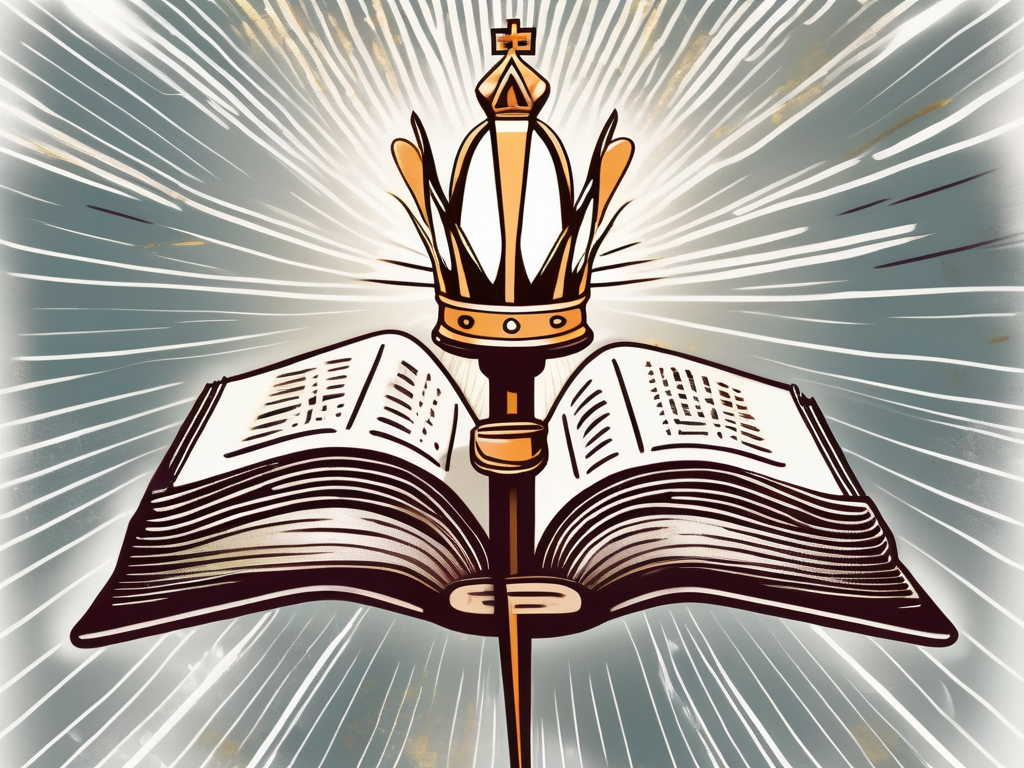Abraham. One of the most prominent figures in the Bible. His story is filled with trials, triumphs, and profound moments of faith. But what exactly is his role in the grand narrative of the Bible? In this article, we will delve into the significance of Abraham and explore the different ways he is portrayed in biblical texts. So, buckle up and embark on this fascinating journey through the life of Abraham.
Understanding Abraham’s Role in the Bible
Before we dive into the specifics, let’s first grasp the broader picture of Abraham’s significance in the Bible. Abraham is considered the father of the Hebrew people and is revered by three major religions – Christianity, Judaism, and Islam. His story not only serves as a reminder of the enduring power of faith but also as a symbol of the divine promises and blessings that God bestows upon His people.
Abraham’s Early Life and Calling
The story of Abraham begins with his early life and calling. Born in Ur of the Chaldeans, Abraham sets out on a transformative journey when he receives a divine calling from God. This calling prompts him to leave behind his homeland and embark on a pilgrimage to the Promised Land. It is in this journey that we begin to witness the unwavering faith and devotion that define Abraham’s character.
As Abraham travels through various lands, he encounters different cultures and experiences diverse customs. These encounters shape his understanding of the world and deepen his connection with God. Along the way, Abraham learns valuable lessons about trust, perseverance, and the power of divine guidance.
During his journey, Abraham faces numerous challenges, both external and internal. He grapples with the fear of the unknown and the uncertainty of leaving everything behind. However, his faith in God’s promises sustains him and gives him the strength to overcome these obstacles. Through his experiences, Abraham becomes a beacon of hope and inspiration for future generations.
The Covenant Between God and Abraham
One of the most significant moments in Abraham’s story is the establishment of a covenant between him and God. This covenant, marked by circumcision, symbolizes the deepening relationship between Abraham and God. It is through this covenant that God promises to make Abraham the father of many nations and bless his descendants abundantly. This divine agreement not only underscores the importance of Abraham but also sets the stage for future biblical events.
As the covenant unfolds, Abraham’s faith is tested once again. He and his wife Sarah face the challenge of infertility, making the fulfillment of God’s promise seem impossible. However, their unwavering trust in God’s plan leads to the miraculous birth of their son Isaac, who becomes a pivotal figure in the continuation of God’s covenant with Abraham.
The covenant between God and Abraham serves as a reminder of the power of divine providence and the fulfillment of promises. It highlights the significance of faith and obedience in forging a deep and meaningful relationship with God.
Abraham’s Trials and Triumphs
Abraham’s story is not without its trials. He faces numerous challenges and tests of faith along his journey. From the famine that forced him to relocate to Egypt to the conflicts he encounters with neighboring kings, Abraham’s faith is consistently put to the test. But despite the hardships, he remains steadfast and emerges triumphant, his faith shining through even in the darkest of moments.
One of the most notable trials Abraham faces is the command from God to sacrifice his beloved son Isaac. This test of faith pushes Abraham to his limits, as he grapples with the conflicting emotions of love for his son and obedience to God. In the end, Abraham’s unwavering trust in God’s plan is rewarded, as God provides a substitute sacrifice and reaffirms His covenant with Abraham.
Abraham’s trials and triumphs serve as a testament to the power of faith and the rewards that come from trusting in God’s guidance. His story continues to inspire and encourage believers to persevere through challenges and remain faithful to God’s promises.
The Symbolism of Abraham in Biblical Texts
Beyond his narrative, Abraham’s significance in the Bible also lies in the symbolism attached to him. Let’s explore some of the key symbolism associated with this remarkable biblical figure.
Abraham, known as the father of many nations, holds a title that goes beyond a mere biological lineage. This title symbolizes his role as the spiritual ancestor of all those who share his faith. It is a testament to the universal nature of God’s promises and the interconnectedness of believers across different cultures and languages. Just as Abraham’s descendants are diverse and numerous, so too is the reach of his influence on the spiritual landscape of humanity.
One of the most profound moments in Abraham’s story is the sacrifice of his beloved son, Isaac. This act of sacrifice serves as a powerful symbol of Abraham’s unwavering faith and obedience to God. It is a reminder that sometimes we are called to make difficult decisions and sacrifices in our own lives. Abraham’s willingness to offer up his most cherished possession demonstrates the importance of placing our trust in God, even when faced with the most challenging circumstances. This story resonates with believers, reminding them of the strength and courage required to follow God’s will.
Abraham’s legacy extends far beyond his own story. His faith and obedience reverberate throughout the pages of the Bible, influencing the lives of countless other biblical figures. From Moses, who led the Israelites out of Egypt, to David, the shepherd who became a king, to the prophets who spoke the word of God, Abraham’s example serves as a source of inspiration and guidance for generations to come. His unwavering commitment to God’s promises and his willingness to follow His commands set a standard for future believers to strive towards.
In addition to his spiritual significance, Abraham also holds historical and cultural importance. He is considered the patriarch of the three major monotheistic religions: Judaism, Christianity, and Islam. His story is shared and revered by millions around the world, serving as a unifying figure across religious boundaries. The impact of Abraham’s life and teachings extends beyond the realm of faith, influencing the moral and ethical frameworks of societies throughout history.
Furthermore, Abraham’s journey is a testament to the power of transformation and personal growth. From his humble beginnings as a nomadic herdsman, he became a man of great wealth and influence. This transformation is a reflection of the transformative power of faith and the rewards that come with steadfast devotion to God. Abraham’s story serves as a reminder that no matter our circumstances, we have the potential for growth and change when guided by faith.
In conclusion, the symbolism attached to Abraham in biblical texts is multifaceted and rich in meaning. From his role as the father of many nations to his unwavering faith and obedience, Abraham’s story serves as a source of inspiration and guidance for believers across different cultures and generations. His legacy extends beyond the pages of the Bible, influencing the moral, ethical, and spiritual landscapes of humanity. The story of Abraham is a testament to the transformative power of faith and the profound impact one individual can have on the world.
Abraham’s Influence on Christianity, Judaism, and Islam
Abraham’s influence reaches beyond the realms of the Bible. Let’s explore how his significance is perceived in the three major world religions that trace their origins back to him:
Abraham in Christian Theology
In Christianity, Abraham is often seen as the epitome of faith. His unwavering trust in God serves as a model for believers, inspiring them to cultivate a deep and unshakeable faith in their own lives. Through Abraham, Christians are reminded of the redemptive power of faith and the promise of salvation.
Furthermore, Abraham’s story in Christian theology is not limited to his faith alone. His journey and experiences are seen as a foreshadowing of the coming of Jesus Christ. Just as Abraham was willing to sacrifice his son Isaac, Christians believe that God sacrificed His own son, Jesus, for the redemption of humanity. This parallel between Abraham’s willingness to offer his son and God’s sacrifice of Jesus adds another layer of depth to the significance of Abraham in Christian theology.
Moreover, Abraham’s hospitality towards strangers, as depicted in the story of his encounter with the three angels, is also emphasized in Christian teachings. This act of welcoming and caring for others is seen as a virtue that Christians should emulate, reflecting the love and compassion of God.
Abraham’s Significance in Jewish Tradition
In Jewish tradition, Abraham is revered as the first patriarch, the founder of the Jewish people. His obedience and willingness to follow God’s commands establish the foundation for the covenant between God and the Jewish people. Abraham’s story is central to Jewish identity, shaping their understanding of God’s providence and their role in the world.
Additionally, Abraham’s journey from his homeland to the land of Canaan, as commanded by God, is seen as a symbol of the Jewish people’s own journey throughout history. Just as Abraham left his familiar surroundings to embark on a new and unknown path, the Jewish people have experienced exile, persecution, and diaspora, yet have remained steadfast in their faith and connection to their heritage.
Furthermore, Abraham’s commitment to justice and righteousness, as demonstrated in his plea to spare the cities of Sodom and Gomorrah, serves as a moral example for Jews. This commitment to social justice and ethical behavior is a fundamental aspect of Jewish teachings and is embodied in the concept of tikkun olam, the responsibility to repair and improve the world.
Abraham’s Role in Islamic Teachings
Similarly, in Islam, Abraham is highly regarded as a prophet and a paragon of monotheism. His absolute submission to God’s will serves as a guiding principle for Muslims. Abraham’s story in Islam also includes the construction of the Kaaba in Mecca, symbolizing the unity of all believers in worshiping the one true God.
In Islamic teachings, Abraham’s unwavering faith and devotion to God are highlighted through various trials and tests he faced, including the command to sacrifice his son Ishmael. This act of obedience is commemorated during the Islamic holiday of Eid al-Adha, where Muslims around the world sacrifice animals as a symbolic reminder of Abraham’s willingness to submit to God’s command.
Furthermore, Abraham’s role as a builder and restorer of the Kaaba is seen as a testament to his dedication to the worship of God. The Kaaba, considered the holiest site in Islam, is believed to have been initially constructed by Adam and later rebuilt by Abraham and his son Ishmael. This connection to Abraham further strengthens the bond between Muslims and their shared Abrahamic heritage.
In conclusion, Abraham’s influence on Christianity, Judaism, and Islam is profound and multifaceted. His unwavering faith, obedience to God’s commands, commitment to hospitality and justice, and his role as a builder and restorer of sacred sites have left an indelible mark on the beliefs, practices, and identities of these major world religions.
Interpreting Abraham’s Significance Today
Abraham’s significance extends far beyond ancient texts. His story continues to resonate with people today, offering lessons and insights into our own lives and the world we inhabit.
Modern Perspectives on Abraham’s Faith
In a world filled with uncertainty, Abraham’s unwavering faith provides a source of inspiration and strength. His willingness to trust in God’s promises encourages us to hold onto our own faith, even when faced with the most challenging circumstances. Abraham’s story invites us to reflect on our own beliefs and the role faith plays in our lives.
Abraham’s Influence on Contemporary Religious Thought
Abraham’s story has also played a significant role in shaping contemporary religious thought. Interfaith dialogue and understanding have been greatly influenced by the common heritage shared by Christianity, Judaism, and Islam through Abraham. His story fosters a sense of unity and promotes mutual respect among believers, emphasizing the shared values and beliefs that transcend religious boundaries.
The Enduring Legacy of Abraham in the Bible
As we conclude this exploration of Abraham’s significance, it becomes clear that his legacy is as enduring as it is influential. His story continues to captivate and inspire believers from different faith traditions, reminding us of the power of faith, obedience, and the everlasting love of God.
In closing, Abraham’s role in the Bible is multifaceted. From his early calling to his enduring legacy, his significance spans across centuries, cultures, and religions. As we explore Abraham’s story, we discover not only a profound narrative but also valuable insights into faith, obedience, and the divine promises that shape the human experience. So let us continue to delve into the depths of Abraham’s significance, gaining wisdom and inspiration from his remarkable journey in the pages of the Bible.












